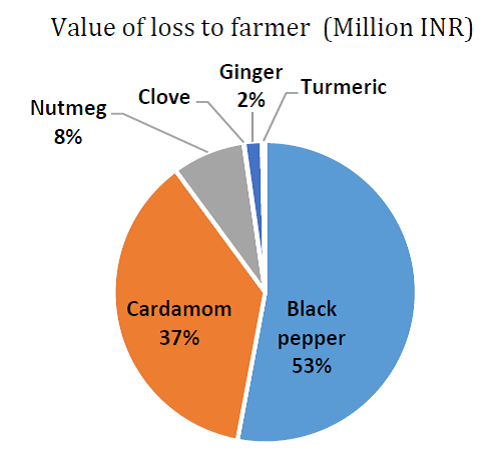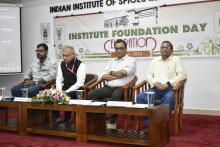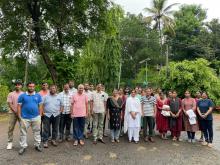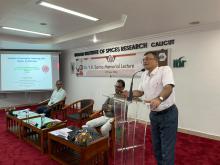EXECUTIVE SUMMARY
Kerala witnessed unprecedented rainfall and flood during June to August months of this year. The state received 2387 mm of rainfall during this period as against the normal value of 1649.5 mm. Thirty-five dams within the state were opened simultaneously for the first time in history. Around 500 people have lost their lives and over a million people had to be evacuated because of the worst floods witnessed by the state. The flooding has affected hundreds of villages, destroyed an estimated 10,000 km of roads and destroyed thousands of homes. All these created havoc across the state and seriously impacted the state’s economy across all sectors.
The devastating floods have crippled the state’s agriculture production in which the plantation and spice crops are the backbone. Kerala cultivates around 1,62,660 ha of spice crops across the state with a production of 140,000 tonnes. However, Idukki and Wayanad together account for nearly 62 per cent of the total area under spices in the state. To gain a quick understanding of the nature and extent of damages caused by rains and floods in spice crops, those districts with high share in area under major spice crops were purposively selected for the study. Incidentally these districts also witnessed a high quantum of south west monsoon. The survey was undertaken with the support of officials of Agriculture Department and other agencies in 60 village panchayats across 27 community development blocks of the state. The major crops considered in the study were black pepper, cardamom, nutmeg, ginger, turmeric and clove which contribute more than 90 per cent of the total spice crops cultivated in the state.
Table 1: Summary of production loss in spices
|
Crop
|
Area affected (ha)
|
Production loss in 2018-19 (tonnes)
|
Value (Million INR)
|
|
Black pepper
|
26613
|
10700
|
4027
|
|
Cardamom
|
15655
|
6600
|
6795
|
|
Nutmeg
|
4400
|
2749
|
1018
|
|
Clove
|
160
|
13
|
9.3
|
|
Ginger
|
1030
|
4100
|
605
|
|
Turmeric
|
395
|
976
|
86.8
|
|
Total
|
48,253
|
25138
|
12541.1
|
The crop loss data collected and compiled by the state agricultural department was further firmed up by to taking into account the crop specific indirect damage due to biotic and abiotic factors to arrive at the production impact of the natural calamity. In black pepper a production loss of about 10,700 tonnes valued at 4,027 million INR is estimated at the prevailing average price for the year 2018-19. The production loss in cardamom is estimated as 6,600 tonnes valued at 6,795 million INR which is around 38.5% crop loss. In a perennial tree spices like nutmeg and clove, the loss in quantitative terms is pegged at 2,749 tonnes of nutmeg valued at 1,018 million INR and 13 tonnes of clove with a value of 9.3 million INR. Meanwhile, ginger and turmeric, the two biannual rhizomatous spice crops, have met with a crop loss of 20% and 15%, respectively. In total, around 48,253 ha has been affected leading to a production loss of 25,138 MT of spices having a value of 12,541 million INR (Table 1). But if you take into account the variable and fixed cost inputs, the cost of re-establishing the crop, the long gestation period to attain full bearing etc., the loss would escalate as 39,012 million INR (Fig. 1).
Analysis of plant and soil samples collected during the survey indicated widespread presence of Phytophthora in black pepper, cardamom and nutmeg samples, Pythium in cardamom and ginger and shot hole borers (Xylosandrus sp.) in nutmeg. The range of observed values for soil physico-chemical properties in flood affected areas were within the normal range usually observed in spice growing soils. Necessary measures for management of pests and diseases as well as soil amelioration need to be taken up in all flood affected gardens.

The estimated crop loss in various spice crops due to rain induced natural calamities in Kerala (in terms of crop value)
For rejuvenating the flood-hit areas a large-scale replanting program with high yielding varieties needs to be launched. The requirement of planting material for this massive program would be about 58.5 million number of rooted cuttings of black pepper, 17.2 million planting units in cardamom, 1545 tonnes of seed rhizomes of ginger, 594 tonnes of turmeric seed rhizomes, 0.35 million nutmeg planting material and about 25.6 thousand plants of clove. The estimated cost of making these planting material is estimated to be 1940 million INR. The cost of other key inputs like FYM, organic cakes, fertilizers, micronutrients, pesticides, bioagents etc. would come to around another 1825 million INR.
ICAR-Indian Institute of Spices Research, Kozhikode, its licensees and other research centres under All India Coordinated Research Project on Spices will be able to extend technological support like providing nucleus planting materials of high yielding and disease resistant varieties, novel techniques for planting material production, crop specific micronutrient mixtures, integrated measures for managing pests and diseases etc. Institutional stakeholders (ICAR, Agricultural department, SAU’s, KVKs, ATMA) need to be seamlessly linked for effective technology dissemination. Integrated farming System models can be demonstrated in these districts with the help of KVKs. Research institutions have an additional responsibility to undertake detailed studies on
- impact of soil erosion and changes in soil strata;
- germplasm tolerant to biotic and abiotic stress
- microbial changes in soil rhizosphere
- management of new pests like shot hole borer of nutmeg
Some of the key policy issues to be addressed immediately by the Government are:
- Flood zoning of the entire agricultural area in the state
- A package for replanting of the affected areas with HYV & tolerant varieties
- Implementing village level crop-weather forewarning systems
- Interest free credit support for sustenance of livelihood activity
For further details please contact:
Dr. K. Nirmal Babu, Director
ICAR-Indian Institute of Spices Research
Kozhikode – 673 012, Kerala
Phone: 0495-2730294; E-mail: director@spices.res.in














